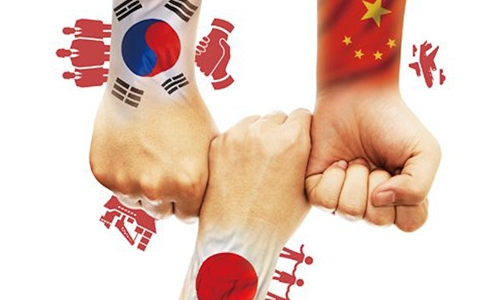Misfortune tests the sincerity of friends. The mutual assistance amid the outbreak of the novel coronavirus pneumonia (COVID-19) between China and its two neighbors – Japan and South Korea, will deepen their mutual trust. Their closer ties will be conductive to the economic integration in Northeast Asia.
South Korea performed well controlling the outbreak until last week, with only 31 infectious patients as of February 18. Yet on Tuesday, Seoul reported the number of confirmed cases has soared to 977 South Korean President Moon Jae-in on Sunday raised the alert level to the highest to battle the coronavirus.
Over half of the infected people are members of the Shincheonji Church of Jesus, a secretive religious sect with a strong presence in the city of Daegu, or their relatives or close contacts, reported by New York Times.
To control the spread of the disease, Seoul needs to urgently identify all infected people and their contacts, isolate and treat them as soon as possible.
However, having adopted the Western democratic system, South Korea cannot implement some compulsory measures that have been successfully carried out in China, which have to go through a series of legislative procedures and approvals first in South Korea. With the approaching legislative election in April, factional struggles tend to be more acute and fierce, which will complicate the implementation of the measures to prevent and control the virus.
Doctors in South Korea have not been given the authority to mandatorily isolate patients. It cannot ensure all infected patients will be isolated and treated, which is the only effective way to contain epidemic at the moment. There are some South Koreans who thought such mandatory moves don’t have a legal basis. Not all South Koreans obey the instructions and orders made by their authorities, which adds to its difficulty in combating the epidemic.
Decisive measures that China has adopted, such as locking down cities, exemplify the advantage of China’s governance system. Compulsory treatment of infected people and isolating them and their contacts has succeeded in curbing the spread of the disease.
In addition to South Korea, East Asian country Japan is also one of the worst-hit countries outside China. Seoul and Tokyo both underestimated severity of the epidemic initially. They might have assumed their public health systems are much more advanced than those in China, and were overly confident the outbreak would not grow as severe as it has in China.
Yet the COVID-19, which differs from MERS, constitutes a dramatic peril, and to date there has not been an efficient way to tackle it.
China has donated coronavirus nucleic acid test kits to Japan. To help Japan and South Korea tackle the epidemic, China needs to share its experience with them.
While the Korean Peninsula nuclear issue remains a sticking point, South Korea has signaled its intention to reinforce its cooperation with China under the framework of the China-proposed Belt and Road Initiative and become more engaged in Northeast Asian economic cooperation.
As these three East Asian countries maintain close economic interactions, South Korea and Japan may worry if the virus grows out of control in China, their economies will be significantly affected. Japan may also be concerned the disease could impact the 2020 Summer Olympics to be held in Tokyo.
China, South Korea and Japan are a community with a shared destiny in geopolitics and economic development. The growing sense of regional identity could be another reason for three countries to deepen cooperation.
Chinese people appreciate the generous assistance and support from these two neighboring countries.
Although the coronavirus could affect the economies of the three countries in short-run, it provides an opportunity to promote friendship and trust among them.
When the outbreak ends, the regional hot-spot issue would lie in its economic recovery and advance, especially the establishment of China-Japan-South Korea free trade zone and economic integration in Northeast Asia. Their closer ties due to mutual aid amid the outbreak will lead them to achieve more in economic collaboration.
The author is professor of Department of International Politics of School of Public Administration at Jilin University and expert on the Korean Peninsula issue. opinion@globaltimes.com.cn




